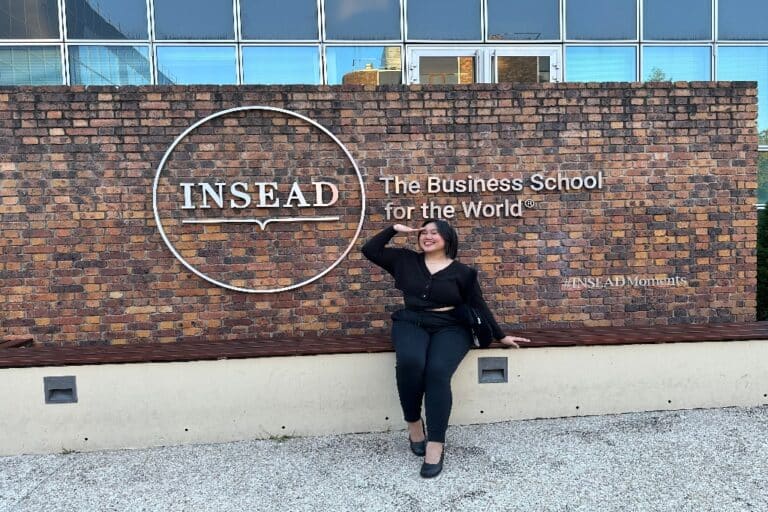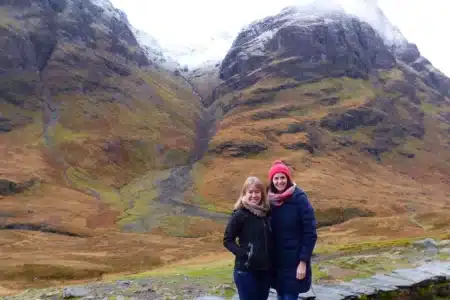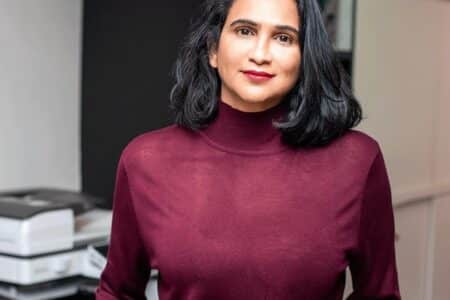
Though it has been 10 years since INSEAD MIM student Ausie Widawati left her home in Indonesia for Singapore, she remains determined to create positive change for her community.
Widawati pursued a STEM degree in Singapore, delving into environmental sciences research, particularly focusing on earthquakes.
This came about after her grandparents’ house was destroyed by the 2006 earthquake in Jakarta.
Throughout her academic journey, she has merged her technical expertise with her passion for environment and technology, along with her interest in business, to effect positive change in her community.
Today, she is pursuing a Masters in Management (MIM) at INSEAD.
After completing six months at INSEAD’s campus in Paris she is now back in Singapore to continue her MIM programme as she looks for a job.
But that’s not all she does.
Widawati has a passion for musical theatre, which is an outlet for her creativity and expression.
She has directed and performed in numerous productions, including notable venues like the National Library Building and the Drama Center.
As she progresses, Widawati aims to make a lasting impact, armed with her skills, passion and unwavering commitment to creating a better future for herself and her community.

Widawati balances her time between completing the INSEAD MIM programme and her passion for musical theatre. Source: Ausie Widawati
1. Can you describe your upbringing in Indonesia and how it influenced your passion for business, technology, and environmental sciences?
During my time as a research scholar at NTU Singapore, where I focused on studying natural disasters like earthquakes, I deliberately chose to centre my research on Indonesian earthquakes.
This decision was driven by my belief in the importance of delving into the challenges faced by my home country and contributing valuable insights to the field of environmental science in Indonesia.
My passion for researching natural disasters is deeply rooted in personal experiences. I remember the emotional toll of the 2006 Yogyakarta earthquake when my grandmother’s house was severely damaged, leaving my mother devastated.
I also distinctly recall being anxious about my mom’s safety when she contracted dengue during the New Year’s flood in Jakarta in 2020. I stayed at home alone, hopeful that my dad could safely get her to the hospital despite the city being flooded.
These intimate encounters with natural disasters are intricately tied to my Indonesian identity, shaping my commitment and motivating me throughout my journey as a student researcher before my time at INSEAD.
2. What strategies have you adopted to help you pick up English?
The main reason why I was able to improve my English is because of my friends and peers. When I was in Indonesia, I went to a national school, so we studied everything in Bahasa.
When I moved to Singapore and attended the Convent of the Holy Infant Jesus (CHIJ), my English really improved.
One thing that really helped me was knowledge transfer. English used to be my weak point, but math and science were my strong points.
For many of my classmates in Singapore, it was the other way around. So they would teach me English and in return, I would teach them maths and science.
What also helped me was going to the National Library every week to read literature pieces and just forcing myself to study regularly and network with people.

The INSEAD MIM programme has helped Widawati to develop herself and her interest in business. Source: Ausie Widawati
3. As a woman in a traditionally male-dominated field, what strategies have you adopted to overcome any gender-related challenges or biases you’ve encountered?
Fight the stereotype that women are less tech-inclined or capable compared to men.
Be confident and do not view myself as less than my peers.
“Men apply for a job when they meet only 60% of the qualifications, but women apply only if they meet 100% of them,” as highlighted in a Harvard Business Review article.
I’ve found that this resonates with my own experiences. There are instances when I tend to overthink the worst-case scenarios, questioning my abilities.
This lack of confidence can be felt by people in the room. Hence I always try to have a positive mindset, reaffirm my ability and walk in with confidence even in ambiguity.

As she is completing the INSEAD MIM programme, she finds that setting goals and dividing her time helps her to balance her studies and other interests. Source: Ausie Widawati
4. How do you balance your academic pursuits with your hobbies in musical theatre, K-pop, anime and manga illustration?
When I did my last production, it was at the same time as my INSEAD application and my GMAT. It was definitely very hard.
What I try to do is set a goal for myself every three months. A mini goal I have to achieve in those months.
For example, I set a goal for myself to get into INSEAD by the end of the three months, so my focus will be on that. So 50% of my free time will go towards achieving that.
From there, I will determine my second and third goals and allocate time and effort to each accordingly.
My goal for now is to find a job and graduate from INSEAD. So, during this time, I can’t focus on musical theatre as much, but I try to still stay in touch by attending stand-up comedy and improve sessions.
5. Why did you choose the INSEAD MIM programme and what do you think is the top way the programme boosts the careers of Indonesian women?
INSEAD MIM is the ideal launchpad, especially for young Indonesian women like me who want to pivot into a business career in Singapore which is different from my technical undergraduate field in Mathematical Sciences.
INSEAD MIM provides guidance in terms of curriculum, career coaching, and personal development opportunities through networking events with industry leaders. I get to meet and be mentored by many inspiring women who were INSEAD alumni and now working at top consulting firms.
These mentorships and sharing have redirected my career path and provided mental and studying material support, which prepared me better for my transition to a career in consulting.

Through the INSEAD MIM programme, Widawati has been able to explore Europe. Source: Ausie Widawati
6. Why did you choose the MIM programme at INSEAD and what do you think is the top way the programme boosts the careers of Indonesian women?
I think the two ways are to prepare them for interviews and long-term networking.
In terms of interview preparation, what INSEAD has done that has been really helpful for me is they have a set up like consulting clubs and my peers actually set up Emerald Consulting Club, which is a pro bono consulting project.
That helped students who didn’t have consulting experience to get into consulting projects with real clients.
We also get those from the MBA programme who have been working at management consulting firms to share knowledge, interview tips, etc.
One advice from a senior who has helped me was “to go to more parties.” I feel a lot of the bonds that I have formed with people are from events like this or from a chat over coffee.
7. What advice would you give other international female students who want to walk the same path as you did?
My advice would be to find the inspiring woman you want to be and talk to her. Learn from her stories.
Since secondary school, my female teachers have been my mentors. I always took their advice and learnt from it. Talking to other women who have gone through the challenges you may face is helpful.
Ausie Widawati is part of INSEAD’s 2024 Limitless Women campaign: Ambition Has No Gender. This year they aim to highlight the stories of extraordinary women who are driving meaningful impact in their communities and beyond.










